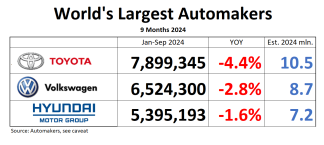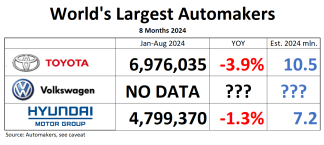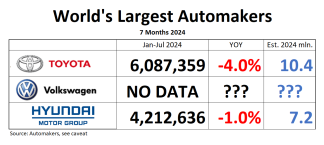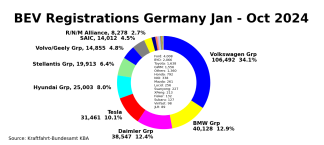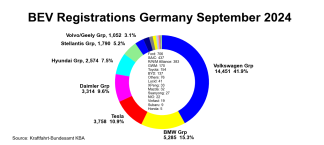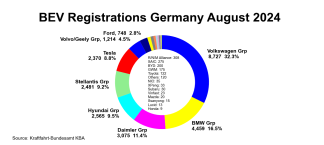
The still-unfolding Volkswagen diesel emissions scandal has earned the largest German automaker more than a week of public opprobrium in the US media, as American owners, regulators and commentators rush to condemn the most blatant case of regulatory evasion in recent automotive history. In Europe, however, the outrage at VW’s emissions manipulation is tempered by a certain amount of realpolitik. French Economy Minister Emmanuel Macron has given voice to European suspicions by suggesting that American automakers are fueling the scandal for competitive purposes, and German officials have made it clear that they intend to “contain” the scandal. Grievances over auto industry issues have long been a source of friction between President Obama and German Chancellor Angela Merkel, and the Volkswagen scandal has brought tensions old and new spilling out into the open.
Volkswagen’s initial conflict with Detroit began with the Beetle, the herald of a new age of fuel-efficiency and reliability that would bring America’s auto industry crashing down from the zenith of its baroque glory. Though Volkswagen never fully leveraged –let alone replicated– the cultural impact of its original “people’s car” in the US market, its global growth has matched GM’s decline since the 1970s and both firms now vie with Toyota for the title of world’s largest automaker. That competition now centers on China, where GM and Volkswagen are slugging it out for dominance of the last great growth market for cars.
This competition might have remained a purely commercial matter, had the 2009 US auto bailout not given rise to one of the more awkward episodes in recent US-German political history. As part of its government restructuring, GM had decided to sell its German Opel division. Merkel’s government extended a $1.5 billion bridge loan to keep Opel operating while they worked to broker a deal that would preserve its German workforce. Having reached an agreement to sell Opel to the parts supplier Magna International, GM abruptly canceled the sale and decided to keep Opel; its announcement just happened come a few short hours after Merkel had addressed a joint session of the US congress.
According to State Department cables in the Wikileaks archive, Merkel was “highly upset” by GM’s “totally unacceptable” reversal, and blamed the Obama Administration for allowing the government-owned automaker to humiliate her in the middle of a state visit.. This diplomatic incident was made all the worse when it became clear that GM’s stated excuse for canceling the deal, the fear that its intellectual property would fall into the hands of Russian firms, turned out to be bunk. Worse, GM’s about-face was seen as a blow to Merkel’s domestic political position, which was very much tied to preserving auto-sector jobs (GM went on to close Opel’s flagship Bochum plant, eliminating more than 3,000 German jobs). The subsequent revelation that the CIA had tapped Merkel’s telephone only deepened German suspicion about its ally’s economic agenda.
Now, just as the bitter memories of this low point in US-German relations are starting to fade, US regulators have tossed another bomb into the relationship by strong-arming Volkswagen into admitting it cheated on emissions tests. Though different forms of “cheating” and “gaming” of emissions tests are widespread throughout the auto industry and the EPA is now testing vehicles from a number of manufacturers, US officials chose to unleash a media firestorm on Volkswagen before finding out who else might be cheating on tests. The ICCT, whose testing had led the EPA to investigate Volkswagen, had studied diesel emissions in Europe and found similar gaps between test- and real-world emissions in most of them. By targeting the largest German automaker’s signature engine technology before investigating more broadly, US officials have tapped into Germany’s long-simmering suspicions.
In light of all this –not to mention the broader indications of a US campaign of regulatory support for its bailed-out automakers, including its destructive and fruitless attack on Toyota over “sudden unintended acceleration”– it comes as no surprise to hear Merkel’s chief of staff tell Bloomberg that the German government is “working hard to contain the damage” that the EPA has unleashed. German authorities are investigating VW’s recently-resigned CEO Martin Winterkorn, but only because German law requires them to investigate any criminal complaint filed by a citizen. A rumored raid of VW headquarters by criminal investigators has not been officially confirmed by the firm or German authorities. Even as it is accused of “cozy relations” with its auto industry, the German government seems more focused on pushing through the initial media firestorm than pouring more gasoline on it.
The German government clearly does have a “cozy” relationship with its economically-crucial auto sector, but the EPA’s decision to unleash the media on Volkswagen before finding out who else has been taking advantage of 40 years of emission test “self-certification” will only push Berlin and its automakers closer together. Now, as German regulators join US, Italian, French, British, Brazilian and other regulators in a global effort to spot-check real-world emissions, the prospect that each nation could use these tests to attack competitors can not be ignored. Surely Germany will try to broaden the scandal, not just away from Volkswagen and other German firms, but from diesel itself where German automakers enjoy an advantage. France, which shares Germany’s affection for diesel (and possibly its share of test-cheating automakers), may focus on gas engines as well. Italy, which has an extensive relationship with Fiat-Chrysler Automobiles, could well try to keep the focus on German diesels. And on it goes.
One hopes that the global wave of testing unleashed by this scandal will end up presenting a fair aggregate picture of who is cheating emissions tests and who isn’t, even if each national regulator focuses on competitors and lets “national champions” off easy. Certainly, the results of these tests will say as much about each regulator’s biases as they will about the automakers who get caught by them. But beyond the emissions issue itself, it’s not difficult to see the more troubling meta-issue bubbling behind it: the rise of automotive nationalism. With the United States increasingly relying on regulatory scandals to defend its bailed-out auto industry from global competitors, a new mercantilism appears to be rising to replace the neoliberal order the US established in the wake of World War II. Whatever advantage the US has gained by bailing out its automakers and attacking their competitors, it’s come increasingly at the expense of the allies and the very global order that once underpinned America’s global economic strength.
